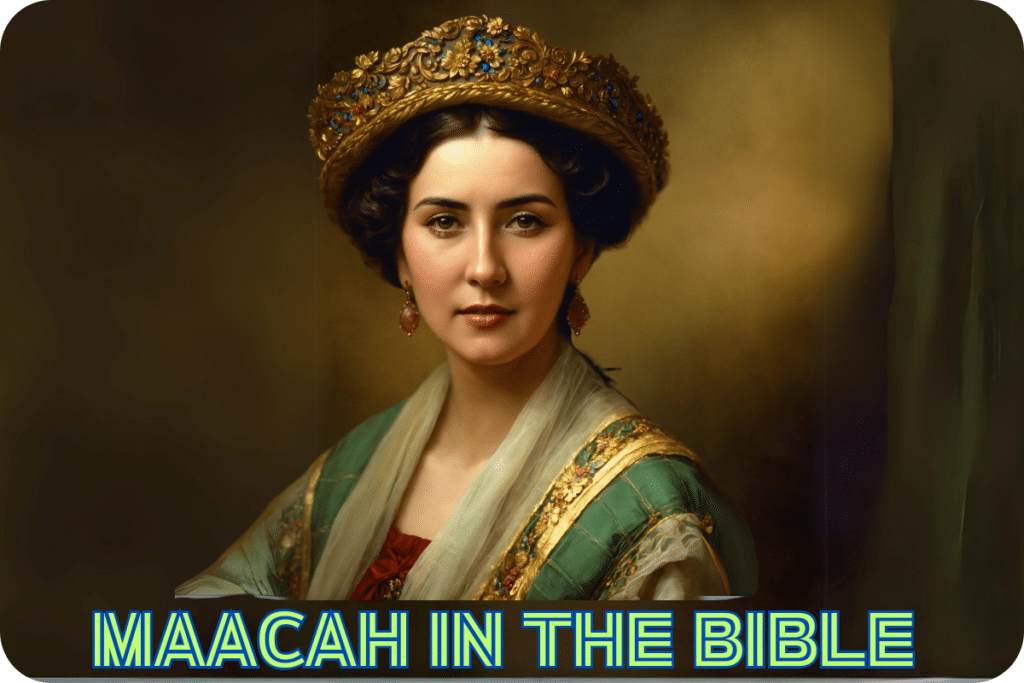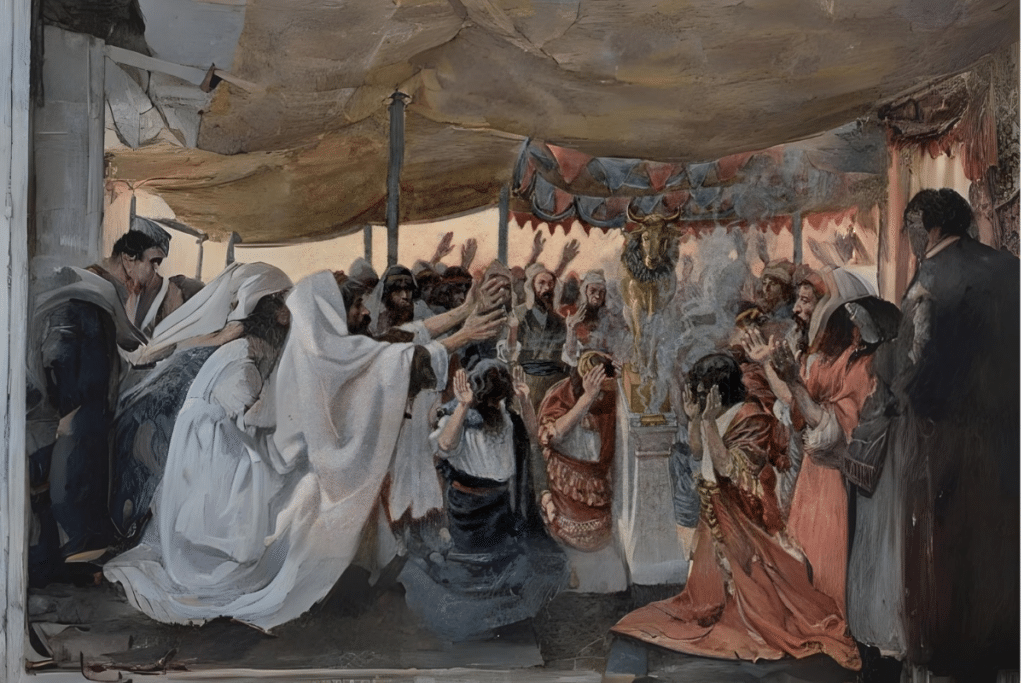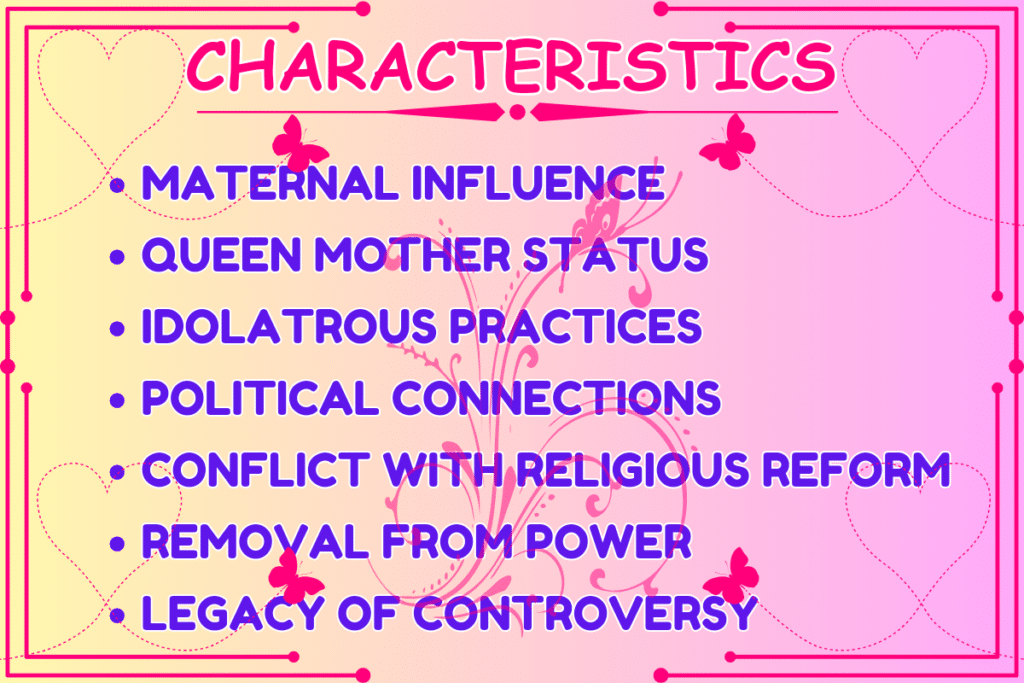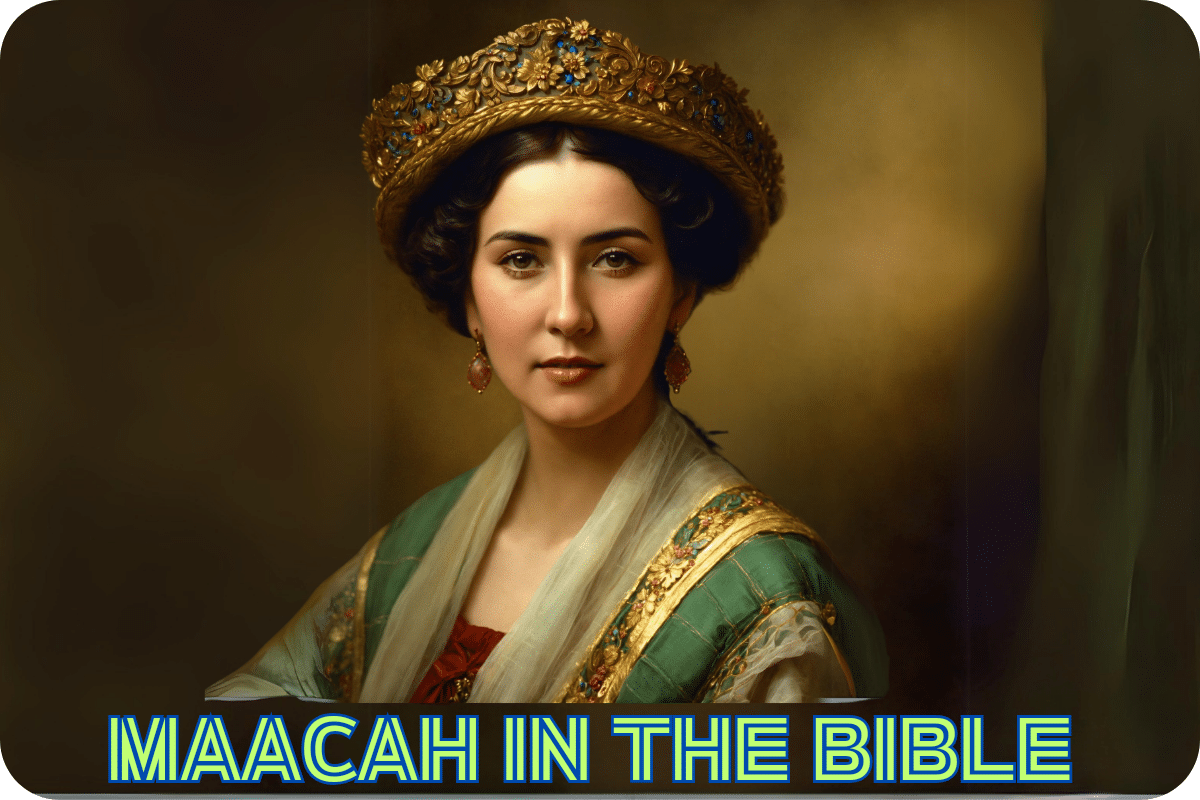MAJESTIC MAACAH IN THE BIBLE
Maacah was the daughter of Absalom and the wife of King Rehoboam of Judah. She served as the Queen Mother during the reign of her son, King Abijam, and later her grandson, King Asa. Maacah’s influence was significant, as the Queen Mother held considerable power in the Israelite monarchy.

However, she was later deposed by Asa for her involvement in idolatrous worship, demonstrating the religious tensions of the time. Maacah’s story highlights the complex dynamics between the royal family, the prophets, and the religious establishment in the divided kingdoms of Israel and Judah.
Who is Maacah?
Maacah in the Bible, the daughter of Abishalom, was a pivotal figure in the biblical narrative, serving as the mother of King Abijam (Abijah) of Judah and the grandmother of King Asa. Her influence extended beyond her family ties, as she held the position of Queen Mother during Asa’s reign.
However, her involvement in idolatrous worship, specifically the creation of an object dedicated to the goddess Asherah, led to her removal from this position by Asa. The story of Maacah in the Bible highlights the complexities of the royal family, the role of women in the monarchy, and the ongoing struggle between religious factions in the divided kingdoms of Israel and Judah.
Maacah’s Family Connections
Relation to King Abijam
Maacah in the Bible was a powerful and influential figure in the kingdom of Judah during the reigns of her son Abijam and grandson Asa. As the queen mother, she wielded significant authority and likely played a key role in shaping the policies of her son’s reign.
However, Maacah’s influence waned when her grandson Asa removed her from her position due to her involvement in idolatry. This suggests that Maacah’s power was not absolute and that she could be held accountable for her actions, even as queen mother. Her story highlights the complex dynamics of power and authority in ancient Israelite society.
Connection to King Asa
Maacah’s influence as queen mother was significant, but her religious practices conflicted with the reforms enacted by her grandson, King Asa. Asa was committed to removing idolatry from Judah, and this led him to depose Maacah from her position due to her involvement in the worship of the goddess Asherah. This act demonstrates the tension between Maacah’s traditional religious views and Asa’s desire to purify the kingdom’s religious practices.
Asa’s willingness to hold even his own grandmother accountable highlights his dedication to his reforms, even when it meant challenging powerful family members. Maacah’s story illustrates the complex dynamics of power, authority, and religious change within the royal family of ancient Judah.
Link to Abishalom (Absalom)
The Bible identifies Maacah as the daughter of Abishalom, commonly believed to be Absalom, King David’s son. This lineage connects Maacah to the Davidic line, enhancing her historical and theological significance. As the wife of King Rehoboam, mother of King Abijah, and grandmother of King Asa, Maacah’s position within the Davidic lineage underscores her influential role in the royal family of Judah.
This connection to the Davidic line not only highlights Maacah’s importance in biblical narratives but also emphasizes her impact on the religious and political dynamics of ancient Israel.
Maacah in the Bible, as the Queen Mother
As the queen mother, Maacah in the Bible held a position of significant influence and authority in the kingdom of Judah. She was not merely a ceremonial figure, but wielded real power and likely served as an advisor and supporter to her son, King Abijam, and later her grandson, King Asa.
Maacah’s status as queen mother afforded her the ability to shape the kingdom’s policies and religious practices, as evidenced by the tensions between her own idolatrous practices and Asa’s religious reforms. The story of Maacah in the Bible highlights the important role that queen mothers played in the political and religious dynamics of ancient Israelite society.
Religious Influence
Maacah in the Bible, as queen mother, promoted idolatrous practices in Judah, particularly the worship of the goddess Asherah. Her influence on her son Abijam and grandson Asa led to the kingdom embracing these pagan beliefs. However, Asa later enacted religious reforms, removing Maacah in the Bible from her position due to her idolatry and destroying her cult object associated with Asherah.

This contrast between Maacah’s promotion of idolatry and Asa’s reforms highlights the tensions between tradition and religious change in ancient Judah. The story of Maacah in the Bible underscores the significant religious impact that powerful women like queen mothers could have in shaping the kingdom’s practices.
Conflict with King Asa
King Asa’s religious reforms placed him in direct conflict with his grandmother Maacah the queen mother. Determined to purify Judah’s worship, Asa took the drastic step of removing Maacah from her powerful position because of her involvement in idolatrous practices, particularly the worship of the goddess Asherah. This action highlights the seriousness of Asa’s commitment to religious reform and the significant influence that Maacah wielded as queen mother.

Asa was willing to challenge even a close family member in order to eradicate idolatry from the kingdom, demonstrating his dedication to upholding proper worship of the Lord. Maacah’s deposition underscores the tensions between tradition and reform that characterized Asa’s reign.
Biblical References and Interpretation
Maacah in the Bible was the daughter of Absalom, wife of King Rehoboam, mother of King Abijam, and grandmother of King Asa. As queen mother, she wielded significant authority and influence. However, Maacah’s idolatrous practices, particularly her involvement in the worship of the goddess Asherah, led to her eventual removal from power by her grandson Asa.
Asa’s willingness to depose even his own grandmother highlights the seriousness of his religious reforms and the threat he perceived in Maacah’s idolatry. Maacah’s story illustrates the complex dynamics of power, authority, and religious change within the royal family of ancient Judah.
Historical Context
The story of Maacah in the Bible unfolds against the backdrop of a tumultuous period in Judah’s history, marked by political and religious tensions. As queen mother, Maacah wielded significant influence, but her idolatrous practices conflicted with the religious reforms enacted by her grandson, King Asa. Asa’s willingness to depose even his own grandmother highlights the seriousness of his commitment to purifying Judah’s worship.
The story of Maacah in the Bible illustrates the complex dynamics of power, authority, and religious change within the royal family of ancient Judah. Her actions and their consequences must be understood in the context of a kingdom grappling with competing religious influences and shifting political alliances.
The Role of Women in Biblical Times
Maacah’s narrative illuminates the substantial power and influence women could wield in biblical times, particularly in royal settings. As queen mother, Maacah exemplified the significant role women could play, shaping policies and religious practices within the kingdom of Judah.
Her story underscores the potential for female authority in ancient Israel, showcasing how women like Maacah in the Bible could hold positions of great influence and actively impact political and religious dynamics. The account of Maacah highlights the complexities of female leadership and the diverse ways in which women exercised authority in biblical contexts.
Theological Implications
Maacah’s narrative underscores the perils of idolatry and the significance of maintaining religious purity. Her involvement in idolatrous practices, particularly the worship of Asherah, led to her removal by her grandson Asa, who prioritized the eradication of false gods and the restoration of true worship.
Asa’s reforms, influenced by his conflict with Maacah, exemplify the biblical theme of returning to genuine worship and forsaking idolatry, emphasizing the importance of upholding the purity of faith and the dangers of straying from it within the context of ancient Judah’s religious and political landscape.
Legacy of Maacah in the Bible
Maacah’s legacy is a multifaceted one, serving as a cautionary tale about the dangers of idolatry and the importance of religious purity. Her story highlights the significant influence women could wield in biblical history, particularly in royal contexts.
Maacah’s actions, from her involvement in idolatrous practices to her eventual removal by her grandson Asa, underscore the complexities of power, authority, and religious change within ancient Judah. Her narrative stands as a reminder of the lasting impact of individual choices and the intricate roles women played in shaping the religious and political landscape of their time.
Lessons from Maacah in the Bible
The story of Maacah in the Bible offers several valuable lessons that readers can glean from her life and actions:
- Consequences of Idolatry: Maacah’s advocacy for idolatrous worship, particularly her dedication to the goddess Asherah, serves as a cautionary tale about the dangers of straying from monotheistic faith. Her story highlights the consequences that can arise from deviating from the worship of Yahweh.
- Impact of Family Influence: Maacah’s position as queen mother and her familial connections underscore the influence that family dynamics can have on religious beliefs and practices. Her conflict with her grandson, King Asa, reveals the complexities of familial relationships and the challenges of reconciling personal beliefs with royal responsibilities.
- Significance of Leadership: King Asa’s decisive action in removing Maacah in the Bible from power demonstrates the importance of strong leadership in upholding religious integrity and guiding the direction of a nation. His commitment to religious reform serves as an example of the responsibility that leaders have to promote righteousness and oppose idolatry.
- Importance of Religious Purity: Maacah’s story emphasizes the importance of maintaining religious purity and fidelity to God’s commandments. Her removal from power reflects the value placed on adherence to Yahweh’s laws and the seriousness with which violations of those laws were addressed.
- Legacy of Accountability: The story of Maacah in the Bible serves as a reminder of the accountability that individuals face for their actions, especially those in positions of authority. Her downfall illustrates the consequences of leading others astray and the responsibility that leaders bear for the spiritual well-being of their people.
- Opportunity for Redemption: While the story of Maacah in the Bible ends with her removal from power, it also presents the possibility of redemption and renewal. Her grandson’s reforms offer hope for a return to faithful worship and a rejection of idolatry, demonstrating that even in the face of past mistakes, there is always the opportunity for positive change and reconciliation with God.
Overall, the lessons learned from the story of Maacah in the Bible emphasize the importance of fidelity to God, the accountability of leadership, and the potential for redemption in the face of moral failure.
Characteristics of Maacah in the Bible

Maacah, a figure mentioned in the Bible, possesses several notable characteristics that shape her identity and influence within the biblical narrative:
- Maternal Influence: Maacah in the Bible is primarily recognized as the mother of King Abijam (also known as Abijah) of Judah. Her maternal role signifies her importance within the royal family and her potential influence on her son’s reign.
- Queen Mother Status: As the mother of a king, Maacah in the Bible holds the prestigious title of queen mother. In ancient Near Eastern societies, the queen mother often wielded significant authority and influence in court politics and decision-making processes.
- Idolatrous Practices: One of Maacah’s defining characteristics is her association with idolatry. She is depicted as promoting the worship of Asherah, a Canaanite goddess, which goes against the monotheistic worship prescribed by Yahweh in the Israelite religion.
- Political Connections: Maacah’s lineage is traced back to Abishalom, commonly identified as Absalom, the son of King David. This familial connection places her within the Davidic dynasty and highlights her role in the royal lineage of Judah.
- Conflict with Religious Reform: Maacah’s advocacy for idolatrous worship brings her into conflict with King Asa, her grandson, who institutes religious reforms aimed at purging Judah of idol worship. This conflict underscores Maacah’s resistance to change and the tension between traditional and reformist religious practices.
- Removal from Power: King Asa’s commitment to religious reform leads to Maacah’s removal from her position as queen mother. This demonstrates the extent of Asa’s dedication to upholding Yahweh’s commands and the consequences faced by those who oppose his reforms.
- Legacy of Controversy: The story of Maacah in the Bible serves as a cautionary tale about the dangers of idolatry and the influence of familial relationships on religious and political matters. Her legacy highlights the complexities of leadership and the challenges faced by those striving to uphold religious purity.
Understanding Maacah’s characteristics provides insight into the political, religious, and social dynamics of ancient Judah as depicted in the biblical texts.
Conclusion
Maacah’s life, as depicted in 1 Kings 15:2-13, encapsulates a compelling narrative with profound religious and historical implications. Her tale serves as a poignant reminder of the enduring conflict between faithfulness and idolatry, showcasing the significant impact individuals, even powerful women like Maacah, can have on shaping the religious and political landscape of their societies.
Through her struggles, the complexities of power, loyalty, and religious change are vividly portrayed, highlighting the timeless themes of devotion, temptation, and the consequential choices that reverberate through generations, resonating with the intricate dynamics of faith and influence in ancient Judah.
Reference
Unique FAQ’s
Who was Maacah in the Bible?
Maacah was the mother of King Abijam and the grandmother of King Asa. She is notable for her idolatrous practices and her eventual removal from power by Asa.
What role did Maacah play in the religious practices of Judah?
Maacah promoted the worship of Asherah, a pagan deity, which significantly influenced the religious direction of Judah until Asa’s reforms.
How did King Asa deal with Maacah’s idolatry?
King Asa deposed Maacah from her position as queen mother and removed her idols, demonstrating his commitment to religious reform and the worship of Yahweh.
What can we learn from Maacah’s story?
Maacah’s story teaches the importance of religious integrity, the dangers of idolatry, and the impact of strong leadership in guiding religious practices.
How is Maacah remembered in biblical history?
Maacah is remembered as a queen mother whose idolatrous influence was significant enough to warrant her removal by her own grandson, highlighting the complexities of familial and religious dynamics.


1 thought on “39. MAJESTIC MAACAH IN THE BIBLE”